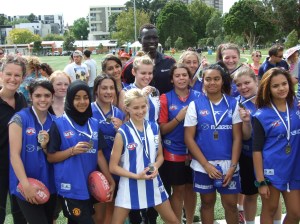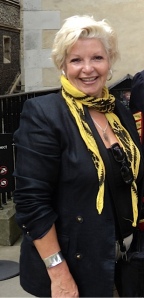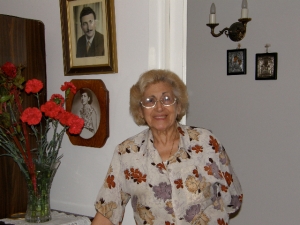
Meriam Ibrahim. Photo: Amnesty international
Hala Al-Kareb
Meriam Ibrahim Yahya is incarcerated and shackled in Sudan’s Omdurman Women’s Prison. Her twenty month old child and her new born baby are with her. Charged with apostasy earlier this month, she faces flogging and then death by hanging.
‘Meriam’s courage’ is the title of a story that was told in Sudan primary school reading books during the 1970s. It’s about the little girl Meriam who saw the floods coming from a distance towards her village, she ran fast and alerted her people and eventually saved them. I remember that Meriam’s story of courage was an inspiration for girls at a time in Sudan when heroic acts were not boys-branded, and girls could also be heroines and rescuers.
Fast forward to May 15th, 2014 when Meriam Ibrahim Yahya, a 27 year old Sudanese woman from Gadarif in Eastern Sudan, stood in front of Haj Yousif court in Northern Khartoum and rejected, with great bravery, the miserable attempts by the court judge to force her to repent (ÇÓÊÊÇÈÉ – calling the apostate to repent before he is executed). With audacity Meriam told the court “I am a Christian, I did not convert from Islam”.
Meriam’s solid stance brought back the memory of the execution of the Sudanese Islamic thinker and reformer, Mahmud Taha, who was executed in 1985 in Sudan under the same apostasy charges.
The story began back in 1983 when the miserable dictator of Sudan at the time,Gaafar al-Nimeiry, in his desperate attempt to save his failing regime created an alliance between his regime and the Muslim Brotherhood political organization. Both were engaged in designing what was called at the time, ‘The September Laws or/ Islamic Sharia Laws’ – a combination of the most militant interpretations of religion jurisprudence (Figah), and the accumulative heritage of Dark Ages political repression. The whole purpose was to hunt political opponents and terrorize communities through a blind theological regime with absolute power, assumed to be delegated from above. The core base of the political Islamic state; the criminalization of personal behaviour, control of human interaction, and most importantly, the persecution of women as a source of sin and evil. The punishments in September Laws were mostly corporal penalties – ranging from flogging to death by stoning, amputation, imprisonment, and execution. For a short period following the collapse of Nimeiry’s regime, the September Criminal Laws were suspended, only to be revived again in the same exact format following the 1989 military coup by the Sudanese Muslim Brotherhood, and were reproduced again under the Sudan 1991 Criminal Act.
Meriam Ibrahim Yahya’s troubles began in 2013 after she was arrested by Sudanese authorities, when an unknown family member allegedly claimed that Meriam was committing adultery (zina,) in violation of Article 146 of the 1991 Criminal Act. Sudanese officials viewed Meriam as a Muslim cohabitating with her Christian husband, despite Meriam’s insistence that she was in fact a practicing Christian and married to a man of the same faith. But the relationship between Meriam and her husband was nevertheless judged to be adulterous and in violation of Article 146, which forbids the recognition of marriage between Muslim women and Christian men in Sudan. Meriam faces public lashing if convicted of this baseless charge.
In February 2014, an additional charge of apostasy, based on Article 126 of the 1991 Criminal Act, was brought against Meriam. Defined in Article 126 as ‘renunciation of the creed of Islam or public declaration of renunciation,’ Sudanese officials incorrectly claimed that the Muslim [sic] Meriam had, by marrying a Christian man, renounced Islam publicly, and was therefore guilty of apostasy in addition to the initial charge of adultery. Under the 1991 Criminal Act, a conviction of apostasy carries the death penalty. Once again, the charge is based on the Sudanese official position that Meriam is a Muslim woman. Non-Muslims cannot be charged with apostasy.
Even if Meriam had converted to Christianity, the question of the terrorizing nature of Sudan legal system, and policies that openly oppress the freedom of religion and beliefs to the point of legitimizing execution, remains an immediate and vital concern.
The Sudan regime has been implicated for years in the killing of massive numbers of civilians in South Sudan. Currently civilians in the Nuba mountains, the Blue Nile areas, and in Darfur, are being subjected to mass killing by aerial bombardment and militia hostility, and the official discourse continues to justify these war crimes against civilians as being against infidels (kofar- someone who rejects Allah and Islam as a religion). However, it’s extremely important to observe here that the Darfur population is Muslim and a considerable percentage of the populations in the Blue Nile areas and Nuba mountains are also Muslims, yet they are not following the Muslim Brotherhood’s version of Islam which breeds on militancy, the repression of freedoms, and the abolition of other religions.
Sudanese civilians across Sudan have been living in this terror for nearly 30 years, consistently intimidated and apprehended by the burden of the oppressive theological regime. The discourse and praxis consistently revolve around forcibly applying the regime’s version of Islam, as they see it, and as it works for them – hence, by default, you become the enemy.
It’s about time the persecution of civilians in Sudan was looked at through the current regime’s ideology which openly justifies serious forms of violation of human rights. Most importantly, it must be understood that the domination of this ideology and praxis will hold back any opportunity for the country’s transformation towards peace, and block any democratic prospects. The conversation about the current legal situation in Sudan must be prioritized, and given the same amount of attention as that given to the issues of war and peace which continue to dominate the conversation in and around Sudan.
In the meantime, Meriam will remain incarcerated and shackled at Omdurman Women’s Prison, along with her 20-month-old child, and the baby girl she gave birth to on May 27th.
While in Sudanese custody, Meriam has been denied regular contact with legal assistance providers, as well as refused medical care, and has suffered torture, beatings, denial of food, and aggressive interrogations. The Sudanese Criminal Code (1991) mandates that Meriam be permitted, while incarcerated, to breast feed the newborn child for a period of two years. After two years have passed, the flogging and execution will occur. Thus, Meriam is facing another two years of prison with the same treatment she has received up to this point, a reality that is faced as well by her innocent 20-month-old child, forced by Sudanese officials to remain incarcerated with Meriam due to the fact that Meriam’s husband is non-Muslim, and therefore not ‘suitable’ to be given custody of his own child.
Meriam must be released immediately and compensated for the humiliation and torture incurred. But is this possible?
Meriam’s case is a test for all who consider themselves to be moderate and enlightened Muslims in Sudan and around the world. It’s an opportunity to raise their voices against this Dark Age dogma and reclaim Islam by condemning these horrific acts.
This case also sends a strong message to the regional and International actors in and around Sudan that unless the issues of religious militancy, discrimination and the campaigns based on persecution of civilians are addressed and recognised as a central part of the political debate, the road for any breakthrough in the chronic unrest in Sudan will remain blocked.





